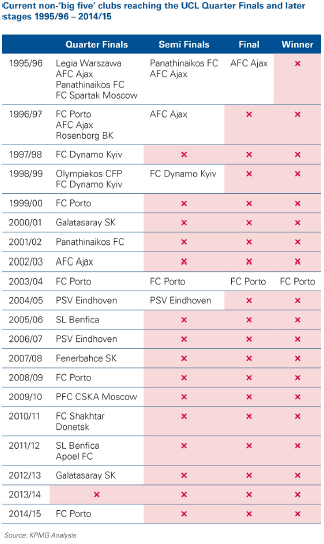By Paul Nicholson
December 10 – Benchmark Sport’s latest report looks at the UEFA Champions league and the spread of representation of nations and clubs. The findings are that the competition has been increasingly – and perhaps worryingly – centralised around the big leagues and the big clubs.
In general money makes more money when it goes to the major clubs, leaving the smaller clubs and ntions even further behind.
Andrea Sartori, Head of KPMG’s Sports Practice said: “It is evident that the competition structure and UEFA’s revenue distribution system, combined with other factors, have contributed in the last decade to an imbalance of power in favor of a limited number of clubs belonging to the ‘big five’ leagues, predominantly Spanish, German and English clubs.
“Unsurprisingly, the ‘big five’ leagues are played in the most economically powerful and populated countries in Europe. Clubs in those countries have large fan bases and their domestic league broadcasting rights can be sold at significantly higher levels than those of other European countries. These economic circumstances give the most prominent clubs in those leagues the opportunity to generate comparatively higher revenues, which in turn allows them to invest and attract the best players on the market.”
The economic power gives the big clubs the ability to sign the better players, better ‘national’ performances, and improved UEFA nation coefficients that keep the clubs from the big leagues dominating. Sartori says “a vicious circle perpetuates itself.”
The topline findings in the report are:
• Before 1997, only the champions of the top domestic leagues qualified for the UCL. In those years approximately 75% of the participants who made it into the group stages were from the non-‘big five’ leagues.
• In 1999, the Champions League was expanded to the current format of 32 teams
• Since the 2000/01 season, the ‘big five’ leagues have provided approximately 50% of the clubs which have made it into the group stages.
• Over the last decade, clubs from outside the ‘big five’ leagues have made it to the quarter-finals of the UCL only ten times, and none of them reached the semi-finals. This compares to the previous decade when clubs from outside the ‘big five’ leagues reached the quarter-finals 16 times, six times advancing to the semi-finals, and twice to the final itself, resulting in one eventual winner.
• The new UEFA distribution cycle has only recently been introduced, so it remains to be seen if this will have any new impact on the progress of clubs outside of the ‘big five’ leagues.

Contact the writer of this story at moc.l1734981012labto1734981012ofdlr1734981012owedi1734981012sni@n1734981012osloh1734981012cin.l1734981012uap1734981012

